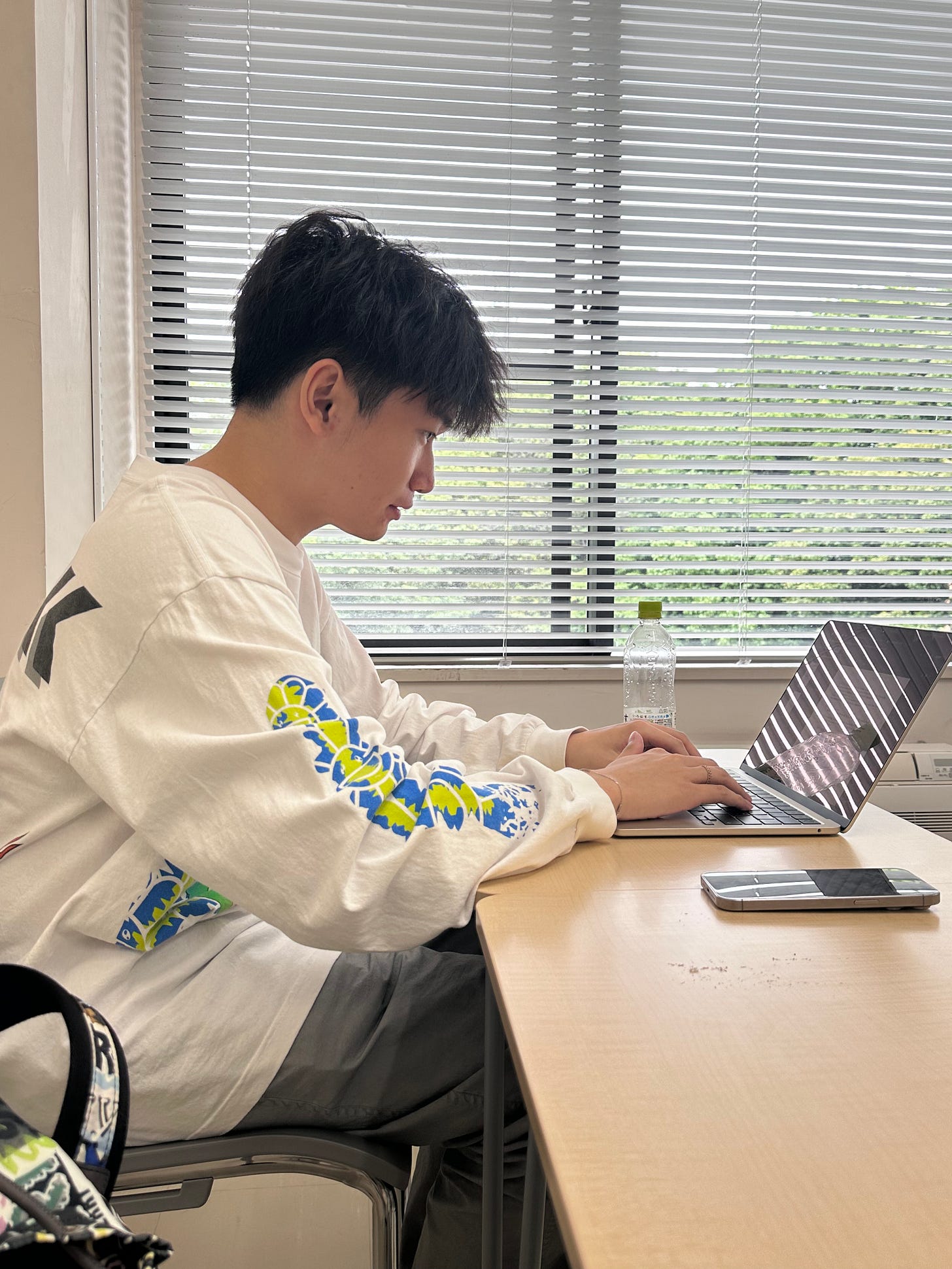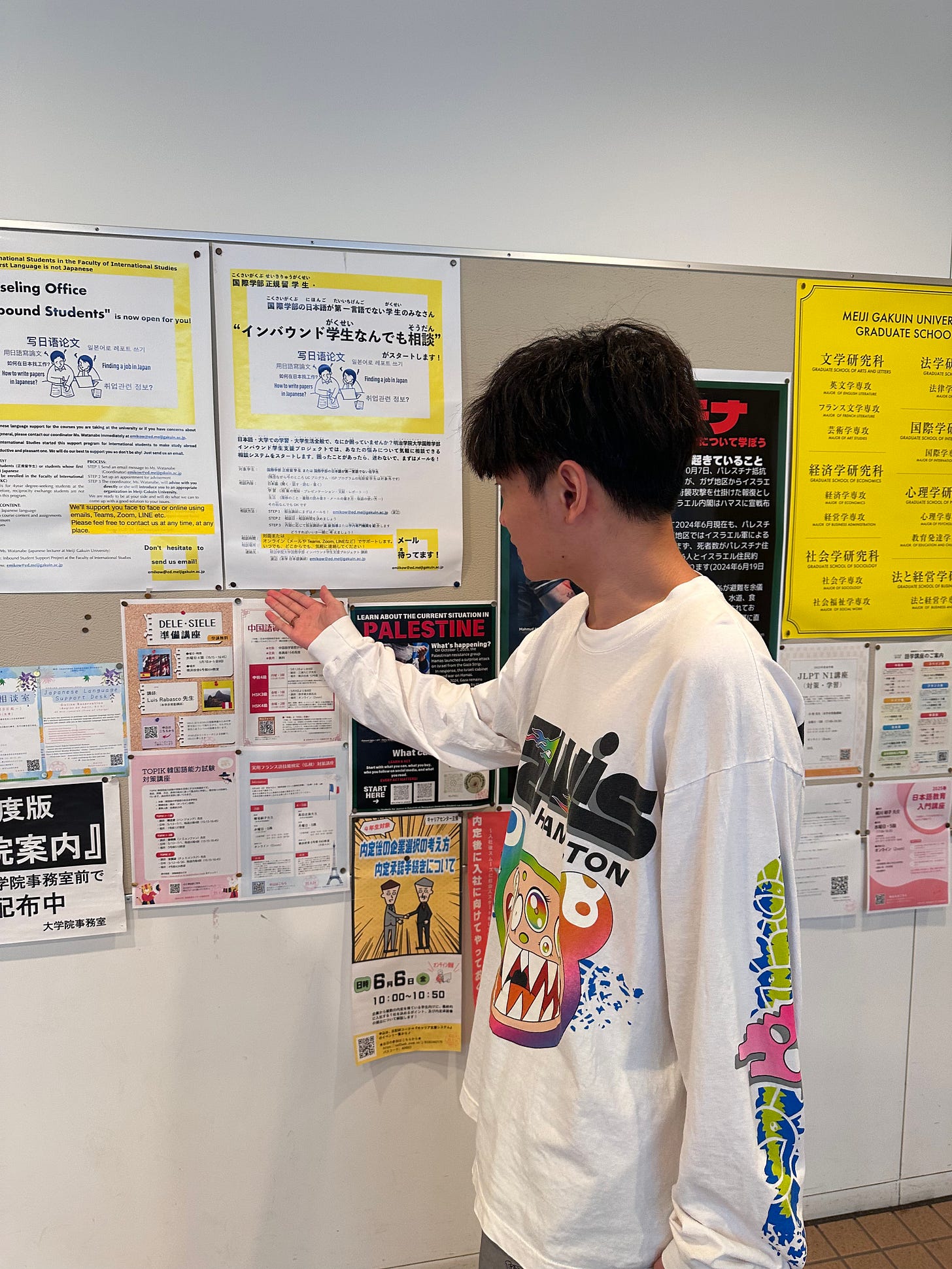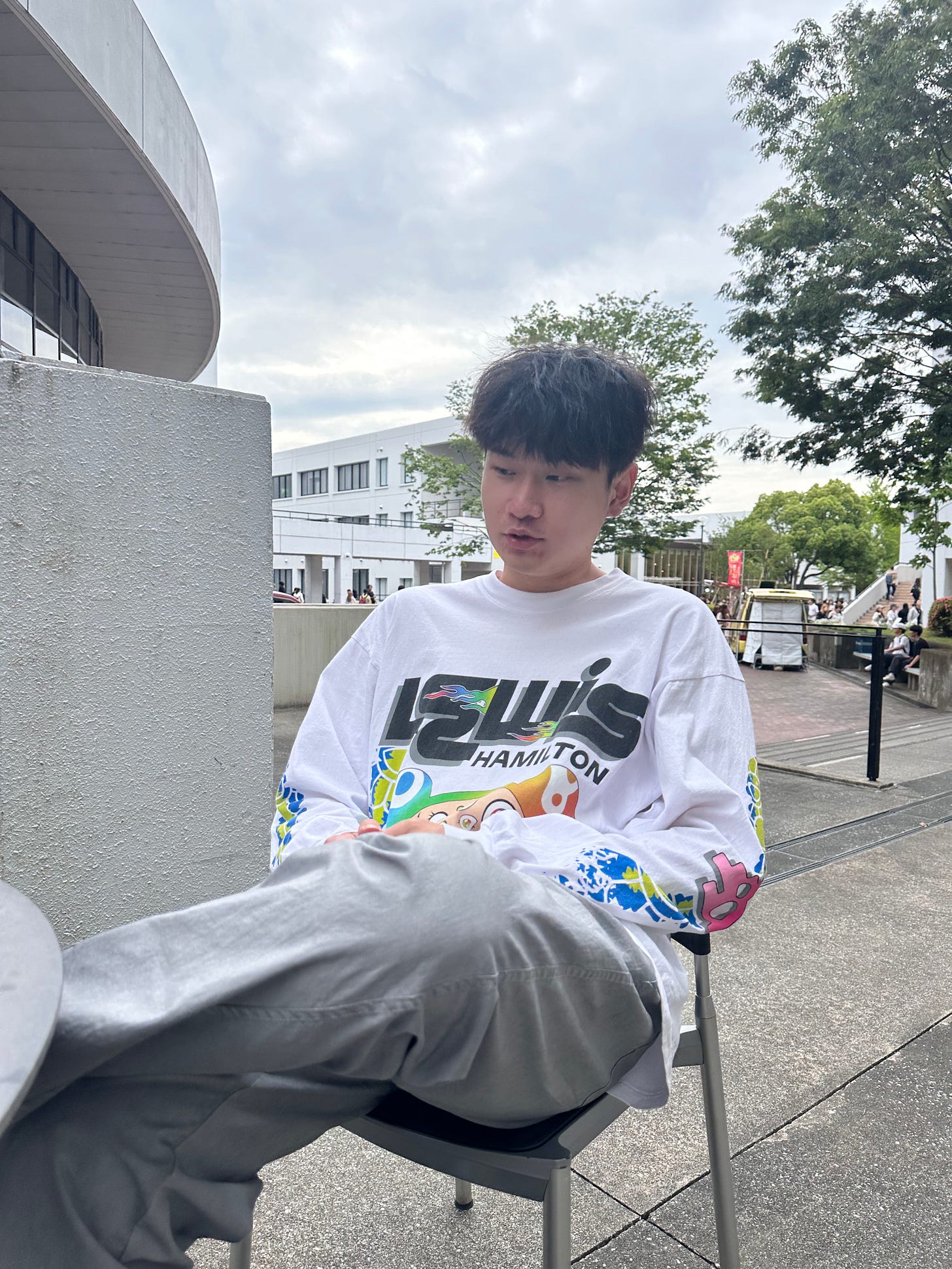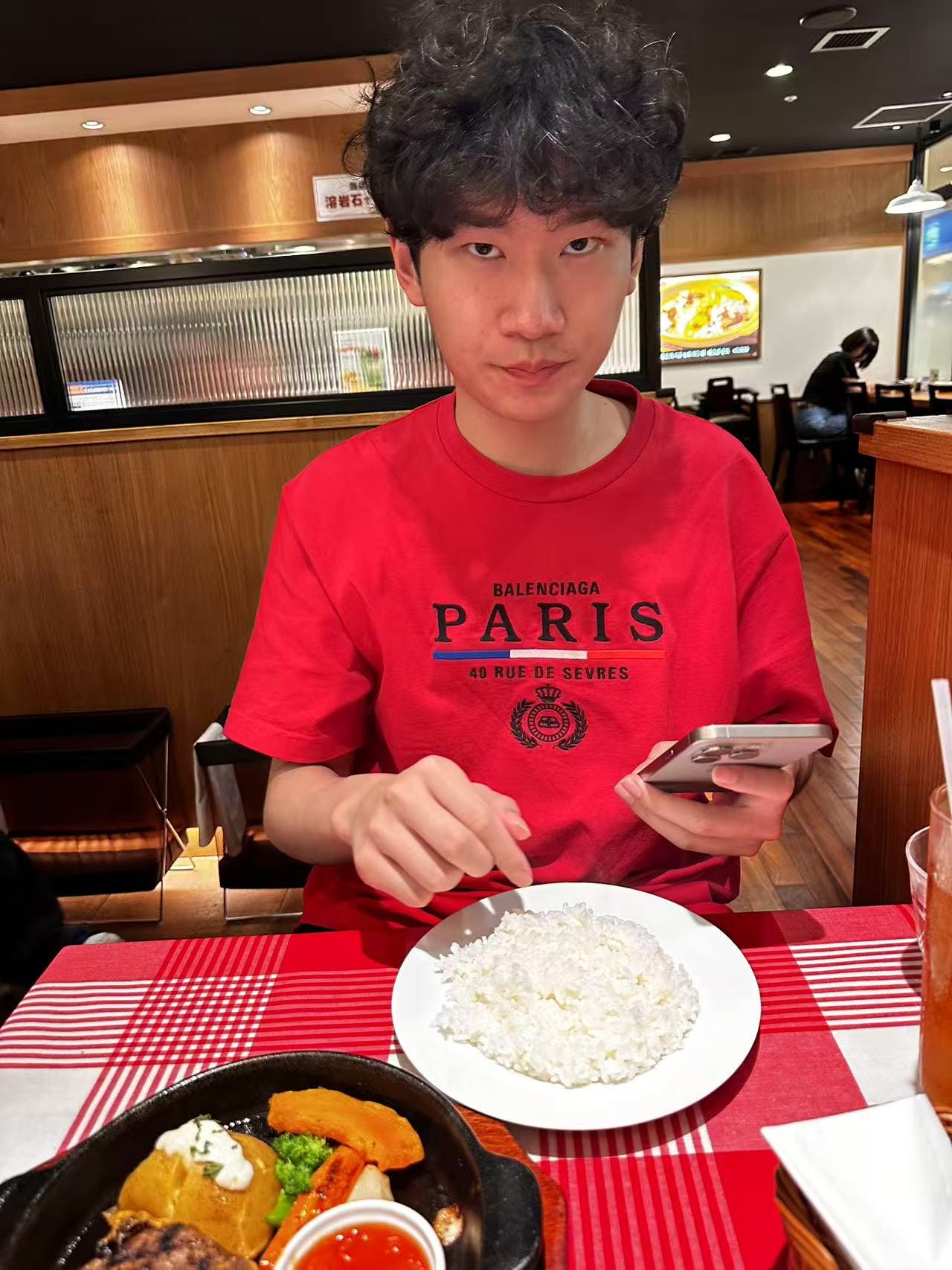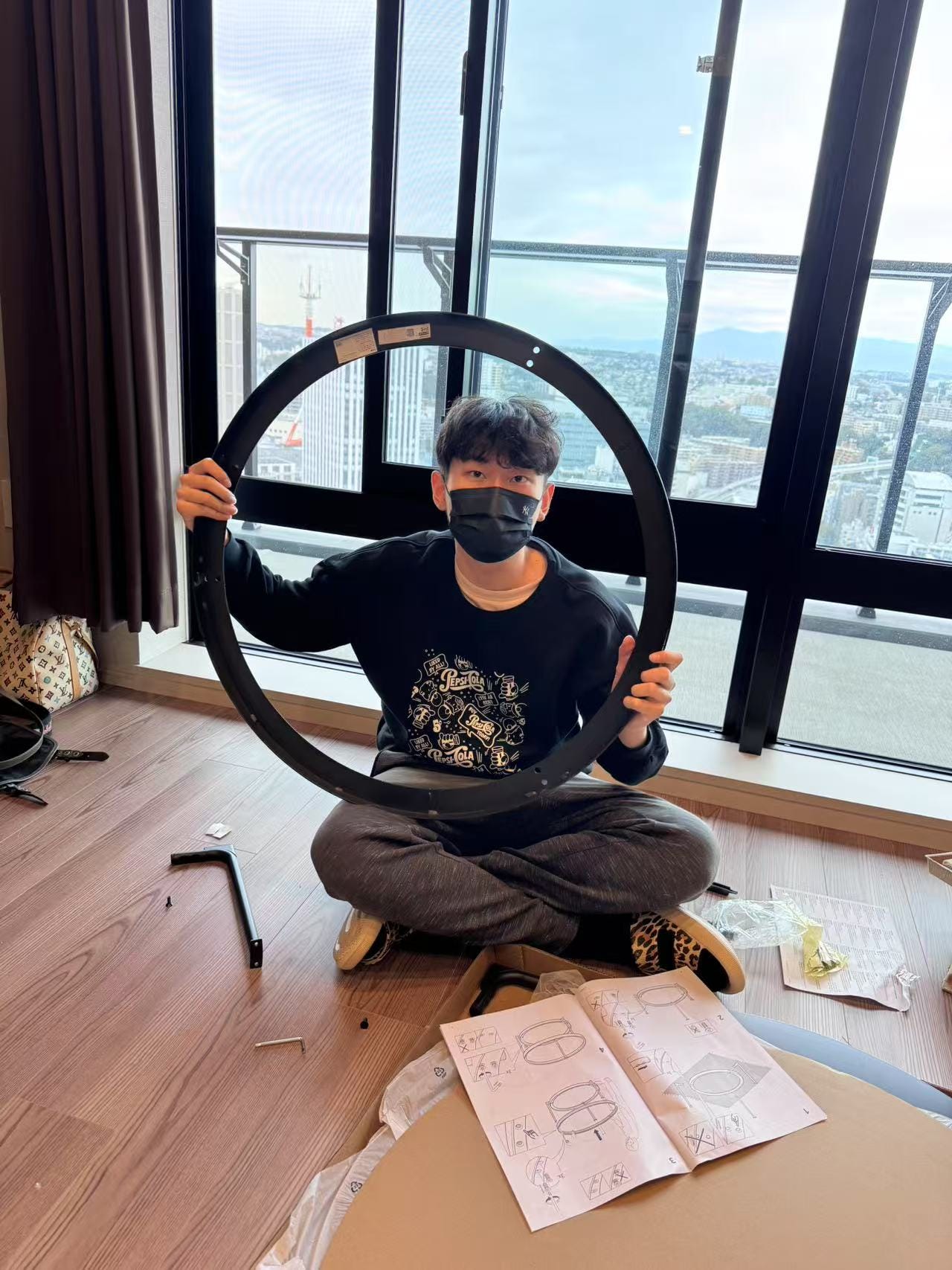Life Adjustment and Cross-Cultural Experiences of a Chinese Student in Japan
An interview with Jiang, 20
Interview Record: Life Adjustment and Cross-Cultural Experiences of a Chinese Student in Japan
22kc1505 CAO YIYANG(researcher, writer)
23ks1100 Aoi Suzuki(transcriber)
21kc1508 ZHANG TIANYUAN(translator)
22kc1510 PENG SHAOYUAN(interviewer, photographer)
Date: May 23, 2025
Interviewee: Jiang, 20 years old, Junior student at the Faculty of International Studies, Meiji Gakuin University
Part 1: Motivation for Studying Abroad & Early Adjustment
Q1: Why did you choose Meiji Gakuin University?
A: I first heard about Meiji Gakuin University during a study abroad fair when I was in high school. I remember walking past their booth, and the staff gave me a brochure. What really caught my attention was their International Studies program. It had a strong focus on cross-cultural communication, and they offered special classes like “Peace Studies,” which you don’t usually see at Chinese universities. I thought that was really interesting and different.
Another big reason was the location. The campus is in Yokohama, not far from Tokyo, but the cost of living is way lower than in central Tokyo. Rent, food, and transportation are much more affordable. That made it more realistic for me and my family. I also liked that Yokohama is a big city but still feels less crowded and intense than Tokyo. It seemed like a good balance for student life.
Q2: What was the biggest challenge when you first arrived in Japan?
A: Honestly, the language. I didn’t go to a Japanese language school before entering university. I came straight after high school, and my Japanese level was almost zero. Everything felt difficult at first. I couldn’t even ask simple questions at the supermarket or order food at restaurants. Taking the train was confusing too—like which line to take, how to buy a ticket, what to say if I got lost. It was stressful.
Luckily, the university offered an intensive Japanese class just for beginners like me. I signed up right away. The class helped me a lot. We had lessons almost every day, and the teacher was really patient. I started understanding basic conversations pretty quickly. After a few months, I could handle everyday situations by myself. That boosted my confidence. Now, I can talk with friends, go shopping, and do most things without any problem.
I’ve realized that Japanese isn’t just useful for daily life. If I want to find a job in Japan in the future, good Japanese is a must. So even now, I’m still trying to improve my speaking and listening, especially casual conversation and business Japanese.
Part 2: Academic and Cultural Differences
Q3: What’s special about the way classes are taught in the International Studies program?
A: One big thing is that most classes are taught in English, which makes it easier for international students. Also, the students in my classes come from all over—Japan, the U.S., Europe, Southeast Asia, you name it. It creates a really diverse classroom environment.
The teaching style is also really different from what I was used to in China. Back home, teachers usually lecture and students just take notes quietly. But here, it’s super interactive. We do group discussions, debates, and lots of presentations. The professors often ask for our opinions and expect everyone to speak up.
At the beginning, I was shy. I was worried about my English and didn’t want to say something wrong. But after a few months, I got used to it. I realized that people here don’t judge you for making small mistakes. The point is to share your ideas and learn from each other. Now, I actually enjoy participating in discussions. It helps me think more deeply and express myself better. I think I’ve become more confident and independent because of this experience.
Q4: What kind of support does the school offer for international students?
A: I think the support system is great. First of all, there’s a tuition reduction system for international students, which helps a lot financially. University in Japan is not cheap, so getting some support makes a big difference.
Also, each international student is assigned a lifestyle advisor. This person is like a mentor or support staff who helps you with daily problems. For example, when I arrived, it was during the COVID pandemic, so a lot of administrative stuff had to be done online—like applying for a residence card or health insurance. It was pretty confusing, but my advisor explained everything step-by-step and even helped me fill out forms. Whenever I had questions about life in Japan—how to go to the hospital, open a bank account—I could ask her. She always patient and supportive. It made me feel like I wasn’t alone.
Part 3: Social Life and Identity
Q5: How do you balance your Chinese friend group and making Japanese friends?
A: In my first year, I mostly spent time with other Chinese students. We spoke the same language and had similar experiences, so it felt natural and comfortable. But after a while, I started to feel like I was staying in a “Chinese bubble.”
The turning point came when I took a presentation class that required working in groups. My group had both Japanese and international students. We had to meet regularly to prepare for our presentation—choosing a topic, dividing tasks, rehearsing, and giving each other feedback. Through that process, we got to know each other better.
At first, communication was a bit awkward, especially because of language differences. But we tried our best—mixing English and simple Japanese—and gradually became friends. Some of us still keep in touch today. That experience taught me that even if it’s hard at first, making local friends is really rewarding. You learn so much about the culture and people’s way of thinking.
Part 4: Future Plans and Advice
Q6: Are you thinking about working in Japan after graduation?
A: That’s something I’ve been thinking about a lot. Meiji Gakuin has a strong network of companies and career support. Many of my seniors have done internships and some even got full-time jobs in Japan after graduation. That gives me some hope and motivation.
But at the same time, I’ve heard from others that Japanese companies can be quite traditional. For example, they often follow the “seniority system,” where promotions depend more on how long you’ve worked rather than your actual performance. I’m not sure if that kind of system suits me.
I think while I’m still young, I’d like to try new things, maybe work in different industries or even different countries. For now, I’m open to working in Japan for a few years to gain experience, improve my Japanese, and understand the work culture better. Then later, I’ll decide whether to stay longer or go back to China, or maybe even explore other places.
Interview Summary
Jiang is a 20-year-old student from China currently studying in the International Studies program at Meiji Gakuin University. His story gives us a real example of what it’s like to be a foreign student in Japan—from struggling with daily life to slowly fitting into the local society.
He chose his university carefully, based not just on academics but also practical things like location and living costs. The International Studies program stood out to him because of its focus on cross-cultural understanding and unique classes that aren’t common in China.
Like many students, he faced major language challenges at first. But with support from the university’s intensive Japanese classes and his lifestyle advisor, he was able to overcome those issues and gain confidence. His academic journey also shows growth—from being shy and unsure in class to actively joining discussions and giving presentations in English.
Socially, he started out mostly sticking with Chinese friends, but thanks to group work in class, he was able to form meaningful connections with Japanese classmates. This kind of cross-cultural friendship is one of the biggest benefits of studying abroad.
Looking to the future, Jiang is open-minded but cautious. He values the career opportunities Japan offers but is also aware of the traditional aspects of Japanese work culture that might not align with his personal goals. His balanced approach shows that he’s thinking carefully about what’s best for him long-term.
Overall, Jiang’s experience highlights the importance of support systems, openness to new experiences, and personal growth when studying abroad. His story is a great reminder that while the journey may be tough at first, it can also be incredibly rewarding.


